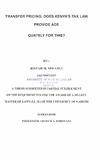| dc.description.abstract | With globalization, international taxation has assumed great significance and urgency for legislation in many countries around the world. Multinational corporations, the engines of globalization and world trade and investment, are able to avoid their tax obligations through strategic transfer pricing practices for their goods and services, and intangible assets, to their affiliates, and deny their business partners (host governments and domestic joint venture partners) their equitable share of returns on their investment. This deprives the host government of much needed domestic revenue to finance recurrent and development expenditure, leading to heavy reliance on foreign grants and debts to balance the budget. This act of depriving the host government of the much needed revenue is known as transfer pricing. Transfer pricing can also be defined in simple terms as a manipulation of prices by a business entity which trades in more than one country, to raise prices in a tax favourable regime in order to compensate the losses on profits they have suffered in unfavourable tax regimes. An OEeD observer has defined transfer pricing as the allocation of profits for tax and other purposes between parts of a multinational corporate group. | |

